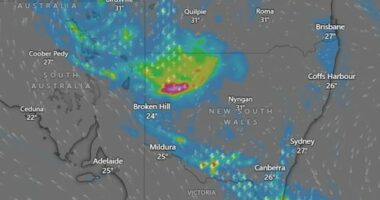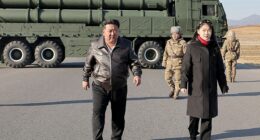Share this @internewscast.com
Prime Minister Anthony Albanese is resolute that Australia will finalize a historic defense pact with Papua New Guinea, despite the deal not being ratified today.
However, the final agreement remains on hold, though Marape said it was still in progress and being examined by the PNG cabinet.

Marape said Australia remained “head and shoulders” above any other international partner of PNG and was the country’s security partner of choice.
The communique to be signed today “depicts us becoming security partners as we go forward in the future”, Marape said.
“I put on record, it was not an Australian proposal. Australia never asked for this. I want to say thank you very much, my brother,” Marape said.

Albanese said the text of the treaty had been agreed on and would be signed after cabinet processes in both countries.
“This treaty will elevate our relationship to the status of an alliance,” he said.
Albanese visited Port Moresby to convene with PNG Prime Minister James Marape, amid widespread anticipation that both nations would formalize a treaty. “This will mark Australia’s first new alliance in over seven decades, and only the third in our history, alongside the ANZUS treaty with New Zealand and the United States,” Albanese stated.
The “agreed-on” text includes a mutual defence clause.
“As your prime minister and chief protector, I am unable to shield this country if someone decides to launch a long-range missile,” Marape expressed.
“I have do work, the fastest, quickest, earliest, the best of my ability to make sure the country is able to protect itself.”
He said Australia would be able to benefit from PNG “manpower” as well.

Asked by a reporter whether he was worried China might use the signing delay to lobby against the treaty, Marape pushed back firmly.
“China has been an enduring friend of PNG for the last 50 years,” Marape said.
“It’s in our shared interests to do, it is nothing against our relationship with them. We ask that they respect our choice of security partners.”
He said China had been very respectful of the PNG government.
Yesterday marked the 50th anniversary of Papua New Guinea’s independence in 1975.
Between the end of WWII and 1975, the land that is now Papua New Guinea was under Australian control.
A portion of the current nation was under British colonial control from 1880, transitioning to Australian governance in 1902, with the other segment previously under German dominion.
During the 50th anniversary festivities, Albanese revealed plans for Australia to aid in constructing a new section of the PNG parliamentary building, designed to resemble a bird of paradise, a cultural emblem of the nation, when viewed from above.
“It is also a signal from Australia that we value your democracy,” Albanese said.














